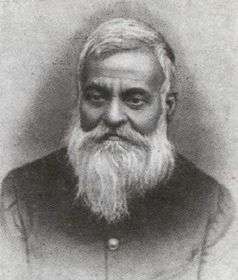Troilokyanath Mukhopadhyay

Trailokyanath Mukhopadhyay (Bengali: ত্ত্রৈলোক্যনাথ মুখোপাধ্যায়, Troilōkyanātha Mukhōpādhyāẏa; b. 2 July 1847, d. 11 March 1919) was a renowned Bengali author. He was born in the small village of Rahuta,[1] near Shyamnagar in the North 24 Parganas district of West Bengal.
Life
Attending school in Hugli-Chuchura and Bhadreswar but largely self-taught, he became a school teacher in Daroka (Birbhum), Ukhra, Raniganj and in Sahajadpur, Sirajganj. From 1868 he served as a police sub-inspector in Cuttack (1868). Having learned Oriya, he joined Bhagavati Charan Das's Utkal Subhakari as editor. Later meeting Sir William Hunter, the compiler of A Statistical Account of Bengal (which historically included modern Bangladesh, West Bengal, Bihar and Orissa), he joined the Bengal Gazetteer Office as a clerk (1870). He became a chief clerk in the Agriculture Department and rose to become its assistant director, before joining the Government of India revenue department (1881). From 1886 he was assistant curator of the Indian Museum in Calcutta. In 1896 he retired on a pension.
During India's Great Famine of 1876–78, which had been aggravated by Viceroy Lytton's policy of exporting Indian wheat and other cash crops, Troilokyanath advised the government that it could save many lives by promoting the cultivation of carrots; the policy was adopted in the Raebareli and Sultanpur districtts of Uttar Pradesh.[2] F. N. Wright notes: "How wonderfully life was preserved in our upper districts by the extension of carrot cultivation, and how important it is to introduce crops (1) which do not fail under the same conditions as the staple crops of the country, and (2) which give a substantial fodder supply in the cold and dry months. Our chief expectations this direction rest upon (1) lucerne in irrigated tracts, mangelwurzel" — a type of beet grown mainly for animal feed — and "(3) extension of the cultivation of carrots, potatoes and other root crops to districts where they are little known."[2]
Literary career
Trailokyanath Mukhopadhyay was a famous writer, one of the pioneers of secular Bengali literature. His literary works are in the school curriculums for Bengali Literature in Bangladesh and the Indian state of West Bengal. One of his most famous works is ডমরু-চরিত (Damru Charit), a collection of humorous and satirical short stories published posthumously in 1923. The stories, set in colonial India, recount the life and times of the antihero Damrudhar, portrayed as a dishonest man who rises from a lowly shop-assistant to a landowner.
Together with Nagendranath Basu, Trailokyanath compiled the first volume of Bangla Bishwakosh, a Bengali-language encyclopedia; Nagendranath completed the remaining 22 volumes.
An English translation of several of his stories is published as Of Ghosts and Other Perils (Arnab Bhattacharya, trans., 2013: Orient Blackswan, 288 pages. ISBN 978-8125052340). That book includes Birbala, Lullu, Nayanchand’s Business, The Pearl Necklace, Smile on Madan Ghosh’s Face, A Story by Damrudhar and Another Story by Damrudhar.[3]
Selected works
- কান্কাবাতি (Kaṅkābatī, 1892)
- Bhoot O Manush (1896)
- Fokla Digombor (1900)
- মুক্তা-মালা (Muktā-mālā, The Pearl Necklace, 1901)
- Bharatbarshio Bigyan Sobha (1903)
- Moina Kothai (1904)
- Mojar Golpo (1905)
- Paper Porinam (1908)
- বীরবালা (Bīrabālā, Birbala)
- লুল্লু (Lullu, Lullu)
- নয়নচাঁদের ব্যবসা (Naẏanacām̐dēra byabasā, Nayanchand’s Business)
- ডমরু-চরিত (Ḍamaru-carita, Damru Charit, 1923)
Notes
- Golpo Songroho (Collected Stories), the national text book of B.A. (pass and subsidiary) course of Bangladesh, published by University of Dhaka in 1979 (reprint in 1986).
- Bangla Sahitya (Bengali Literature), the national text book of intermediate (college) level of Bangladesh published in 1996 by all educational boards.
References
- ↑ 2011 Census: Rahuta Population - North 24 Parganas, West Bengal
- 1 2 F. N. Wright, Administration report by United provinces of Agra and Oudh, 1880, Department of Agriculture and Commerce, N.W. Provinces and Oudh, page 25.
- ↑ Ketaki Datta, Book Review: Of Ghosts and Other Perils by Troilokyanath Mukhopadhyay, Rupkatha Journal on Interdisciplinary Studies in Humanities (ISSN 0975-2935), Vol. VI, No. 3, 2014.